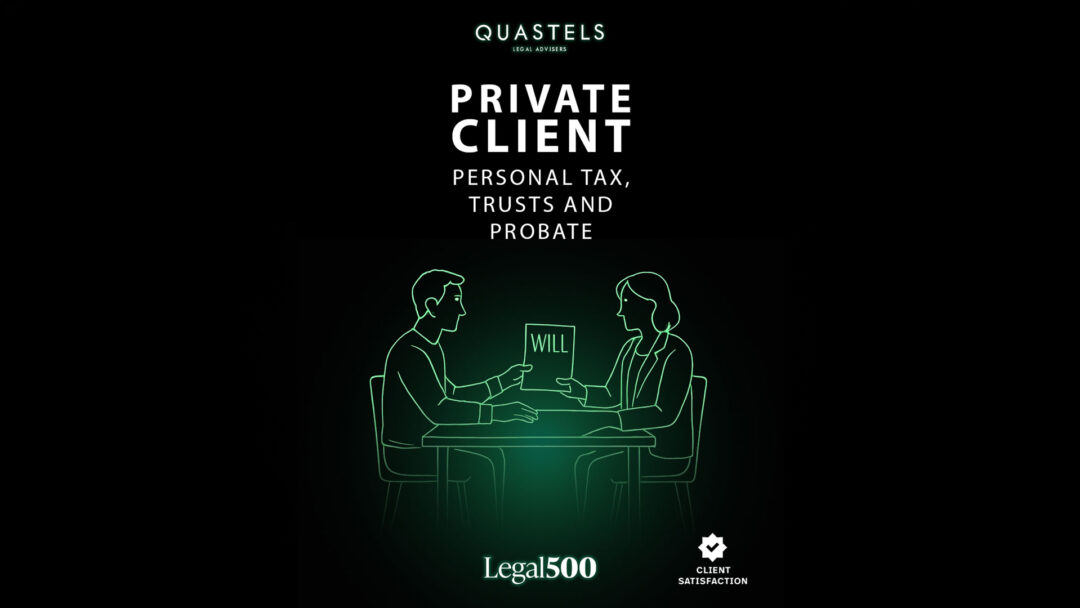Latest Posts
![A New Restraint in Family Farm Estoppel: Maile v Maile [2025] EWHC 2494 (Ch)](https://www.quastels.com/wp-content/uploads/2025/10/Alice-1-600x343.jpg)
A New Restraint in Family Farm Estoppel: Maile v Maile [2025] EWHC 2494 (Ch)
The High Court’s decision in Maile v Maile & Ors [2025] EWHC 2494 (Ch) marks a significant recalibration of how proprietary estoppel operates within family farm disputes. While on its face another failed claim by disappointed descendants, the case carries wider doctrinal implications. This case has the effect of tightening the law around promises and the reliance one has on them and is instead a reminder that there is no replacement for formal advice and legal frameworks to prevent problems further down the line.
In the case involving a multi-generational Devon farming family, the claimants, two grandsons, argued that their grandmother had promised them the family farm in return for their years of labour and loyalty. However, Mr Justice Michael Green rejected the claim, finding that the alleged assurances were too vague, that reliance was not causative, and that no sufficient detriment had been shown.
Limits on Intergenerational Estoppel
The claimants alleged that their grandmother had assured them they would inherit the family farm and that they had relied on those promises to their detriment. The court rejected the claim, holding that the alleged assurances were too vague, indirect, and insufficiently supported by evidence to give rise to an equitable claim.
This generational dimension is critical. Most successful proprietary estoppel cases in agricultural contexts, such as Guest v Guest [2024] AC 833, [2022] UKSC 27 and Winter v Winter [2023] EWHC 2393 (Ch), involve promises made by parents to children after decades of shared labour and reliance. Maile, by contrast, concerned a generational ‘skip’ – grandchildren claiming against a grandparent’s estate, where far less of their time had been devoted to the family farm.
The judgment shows the courts’ reluctance to extend equitable protection to promises that skip a generation. The further the claimant stands from the promiser, in kinship and in time, the higher the evidential threshold to show (i) a clear, unambiguous assurance, (ii) specific reliance casually linked to that assurance, and (iii) real detriment beyond ordinary familial engagement.
The judge noted that this was “not the usual case of a farmer’s child or children claiming that they gave up most of their working lives on the strength of promises made to them”, and the grandsons’ contributions, though genuine, did not approach the level of sacrifice seen in the classic authorities. Vague family conversations to the effect of “one day this will be yours” were viewed as affectionate hopes, not binding promises. Without clear evidence or documents showing a real intention to confer rights, the claim failed at the outset.
Maile signals a clear boundary in intergenerational estoppel. Courts are now likely to require that any promise beyond the immediate parent-child relationship be recorded, evidenced, and objectively referable to an intention to create legal obligations. From an estate planning perspective, this demands early formalisation of succession expectation through Wills, partnership agreements, or letters of wishes.
Commercial Structuring as De Facto ‘Contracting Out’ of Equity
A second, and arguably more influential, strand of the judgment concerns the interaction between proprietary estoppel and formal commercial arrangements. The claimants had entered a 2015 farming partnership with the deceased, which included an option to buy her share and a requirement to vacate the property within a year of her death. The court held that any equitable rights were overridden by these terms, echoing Horsford v Horsford [2020] EWHC 584 (Ch), where formal partnership structures displaced informal assurances.
Having entered into a detailed, independently advised agreement, the claimants were taken to have contracted out of reliance on any prior informal assurances. The partnership became the operative framework for succession, showing that the deceased had already formalised her intentions.
Reflecting a wider trend, the case signals that as family farming becomes more commercial, courts favour formal agreements over equitable claims. Maile confirms that equity will not readily intervene where succession has been legally structured, leaving proprietary estoppel to fill only genuine gaps in formal planning.
A New Equilibrium for Family Farm Equity
These developments mark a narrowing of equitable intervention in family farm estoppel, with the decision showing that equity will not rescue informal, intergenerational promises unsupported by clear evidence, especially where formal contractual arrangements are also in place. Two themes stand out: stricter legal standards, reflected in the higher evidential burden on grandchildren and other remote relatives to prove clear assurances and concrete reliance; and structural discipline, where formal partnerships or corporate arrangements are treated as the governing framework, effectively displacing informal expectations.
From an estate planning perspective, these themes underscore the need for proactive, well-documented succession strategies. It is vital that farming families formalise intentions early, ensure alignment between partnership, corporate, and testamentary arrangements, and record any family understandings with legal clarity.
To discuss your requirements and find out how we can help you, please get in touch.
Read More
Ben Rosen Recognised in Spear’s 500 Tax & Trust Index 2025 as a Recommended Tax Lawyer
Quastels LLP is pleased to announce that Ben Rosen, Private Wealth & Tax partner, has been listed in this year’s Spear’s 500 Tax & Trust Index as a recommended Tax lawyer.
About The Spear’s 500 Tax & Trust Index
The Spear’s 500 Tax & Trust Index is a highly regarded guide that showcases the leading advisers to ultra-high-net-worth individuals and family offices. It recognises specialists across a broad range of disciplines, including:
- Tax Lawyers
- Tax and Trust Barristers
- Trusts, Structuring and Offshore Experts
- Contentious Trust Lawyers
- Probate and Wills Lawyers
- Accountants and Tax Advisers
Recognised for multi-jurisdictional expertise
Ben’s recognition in this index showcases his expertise in multi-jurisdictional work, and his experience in navigating the issues surrounding HNW individuals and international families with complex structures and needs.
“Ben Rosen, who works with clients on property investments, trusts and family investment companies, tells Spear’s that his strength is not just in the tax expertise he provides, but in making complex and often emotional issues easier for his clients. ‘Being good at tax is a given; what makes an excellent adviser is making the information more digestible,’ he says.”
– Spear’s Review, Spear’s 500
We congratulate Ben on this achievement, which highlights his commitment to delivering exceptional advice and service to our clients.
Click here to read Ben’s profile in full.
Read More
Quastels Recognised in the Legal 500 UK 2026 Rankings
We are pleased to announce that Quastels has been recognised in this year’s The Legal 500 UK 2026 rankings across four categories:
- ‘Leading Firm’ in Commercial Property: Corporate Occupiers
- ‘Leading Firm’ in Private Client: Personal Tax, Trusts and Probate
- ‘Leading Firm’ in Industry Focus: Hospitality & Leisure
- ‘Firm to Watch’ in Industry Focus: Retail & Consumer
We are pleased to have retained our ‘client satisfaction’ badge, which reflects our dedication to exceptional service and expertise across the firm.
About The Legal 500
The Legal 500 is widely regarded as one of the most respected legal directories, evaluating law firms and individual lawyers through rigorous independent research, client testimonials, and industry insight. Earning a place in The Legal 500 reflects a firm’s commitment to delivering exceptional legal services and cultivating strong client relationships.
At Quastels, we are proud of our longstanding reputation for excellence and client care, and we are delighted to be recognised in this year’s rankings.
Key Rankings

Commercial Property: Corporate Occupiers
For five consecutive years, our Commercial Property team has been recognised in the Commercial Property: Corporate Occupiers category.
The ranking highlights our extensive legal expertise, particularly in:
- Portfolio management
- Acquisitions
- Disposals
Our practice spans the retail, leisure, and office sectors, delivering bespoke advice to businesses navigating commercial property matters.
Recognised Legal Professionals
The Legal 500 ranking specifically commends our department heads and key individuals for their contributions:
- Mark Cornelius (Partner and Co-Head)
- Naomi Jones (Partner and Co-Head)
- Jonathan Gross (Partner)
- Aisha Anjum (Senior Associate)
Client Testimonials
The following testimonials have been collated independently by the Legal 500 research team.
“Quite frankly, it’s the team’s proactive nature, the partners are available when you need to speak to them, and they are always trying to provide a solution for you and the underlying client.”
“The team have a deep understanding of our business and tailor their advice accordingly; we know we can rely on them to be concise and responsive to our complex and changing needs.”
“Quastels have gone above and beyond acting on our behalf. The due diligence checks have been extensive, and they utilised relationships with firms abroad to ensure that the recorded notice was served promptly and at a reasonable cost to us as the client.”

Private Client: Personal Tax, Trusts, and Probate
Our Private Wealth team has been recognised for the first time in The Legal 500, in the Private Client: Personal Tax, Trusts, and Probate category.
The ranking highlights our expertise in existing and emerging fields, including:
- Tax
- Trusts
- Succession Planning
- Tax aspects of cryptoassets
Recognised Legal Professionals
The Legal 500 specifically mentions the work and expertise of:
- Ben Rosen (Partner and Head of Department)
- Jack Burroughs (Senior Associate)
Client Testimonials
The following testimonials have been collated independently by the Legal 500 research team.
“This is a team which is high energy, extremely responsive and authentic.”
“Ben Rosen is a delight. He absolutely loves what he does which makes him really fun to work with. He inspires great confidence with clients and has the sort of grasp of complex material to be able to articulate it clearly.”
“Ben Rosen – excellent solicitor. Prepared to go the extra mile for a client. Highly recommended.”

Industry Focus: Hospitality & Leisure
This year, we are pleased to further expand our presence in The Legal 500 rankings, being named a ‘Leading Firm’ in the Industry Focus: Hospitality & Leisure category.
Our Hospitality & Leisure sector offering received recognition for assisting clients across the restaurant, theatre, hotel and pub sectors, amongst others, with key work including:
- Sales
- Restructurings
- Commercial contracts
- Fund structuring
- Asset management
Recognised Legal Professionals
The Legal 500 recognised these key players in our Hospitality & Leisure group:
Client Testimonials
The following testimonials have been collated independently by the Legal 500 research team.
“We have used Quastels numerous times and they can always find a commercial solution to sometimes complex problems, not just looking at the legal ramifications but the commercial ones as well.”
“One of the standout features of Quastels is the diversity within their team – not just in background, but in experience and perspective. This diversity enhances their ability to handle complex, cross-disciplinary issues with nuance and agility.”
“I’m especially grateful to Adam Convisser for his time, expertise, and unwavering support. In moments of stress, he reassured me and guided me through challenges with professionalism, empathy, and clarity. I’ve developed a genuinely strong relationship with him, which speaks volumes about the quality of service and personal attention Quastels provides.”

Industry Focus: Retail & Consumer
We are pleased to have retained our standing as a ‘Firm to Watch’ in the Industry Focus: Retail & Consumer category. Our Brands & Luxury sector offering received recognition for its cross-disciplinary approach, providing legal solutions across corporate, commercial, real estate, employment, and governance issues.
Recognised Legal Professionals
The Legal 500 highlighted the contributions of:
Thank You
We are incredibly proud to be growing our recognition in The Legal 500, which reflects the development of the firm over the past twelve months. A heartfelt thank you to our clients, colleagues and The Legal 500 for their continued support and kind words. Our growing recognition motivates us to continue delivering fantastic service across all of our practice and sector areas.
If you require legal assistance, please contact us, we would be delighted to help.
Read More